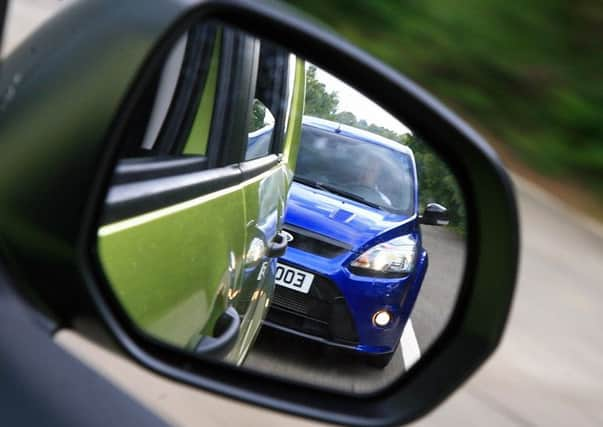YEP Letters: October 10


A prime lesson in ambiguity?
Ernest Lundy, by email
With reference to the comments of Simon Wilson, ‘Drivers keep your distance’, on tailgating (YEP Letters October 6), the Highway Code agrees it is sensible to allow more braking time to avoid being rear-ended, but that to do so in circumstance where one may intrude beyond a white line at traffic lights etc, is still to commit an offence.
This is a prime lesson in ambiguity to say the least.
What is it they say about being ‘between a rock and a hard place’?
A serious injustice against home owners
DS Boyes, Leeds 13
Advertisement
Hide AdAdvertisement
Hide AdONE subject that politicians, including the present minority Conservative government, ignore at their peril, unless it is addressed Jeremy Corbyn to add it to his manifesto wish list for the next election, is care costs.
Thankfully under the welfare state people are living much longer, but more are succumbing to diseases of old age e.g. Alzheimer’s or dementia. The main problem being that legislation embodied in the 1948 National Insurance Act concerning contributions from personal assets is out of date and out of step with today.
My grandparents never owned a house and in 1948 (my parents married in 1941 and my dad was in the Army until 1946) it was an impossible dream, with social housing their only aspiration.
The capital limit was only £23,250, i.e. the price of a five door hatchback car, unlike in 1948 when few ordinary people owned freehold property. Today the family home is the only tangible asset for most, many of them bought 50 years earlier by the elderly of today for maybe less than £2,000, now have a six figure value.
Advertisement
Hide AdAdvertisement
Hide AdThis sole asset which many hoped would pass to children or grandchildren is now liable to be seized by the local authority for care costs. Only home owners suffer this, not tenants whose costs are paid in full by the taxpayer.
Mrs Thatcher wanted a ‘property owning democracy’, John Major wanted ‘wealth cascading down the generations’ and David Cameron believed it ‘unfair’ for homes to be seized, and proposed a £70,000 cap, but all these ideas came to nothing, like Theresa May’s suggested £100,000 cap which merely highlighted the problem and lost her the 2017 election. This serious injustice against the home owner needs to be addressed asap.
We welcome May’s message
Stephen Purvis, chair, Policy North
WE welcome the Prime Minister’s commitment to entrepreneurs, enterprise and the private sector.
The Prime Minister’s support for innovation and wealth creation is very welcome. She gave her backing to continued investment in the North, coming after £300m for Northern infrastructure was announced by the Chancellor. This is the positive message businesses across the North want to hear.
UK in a position to bargain
John Walsh, Altofts.
Advertisement
Hide AdAdvertisement
Hide AdWhy is there a view pervading in the country, and particularly in the Labour Party, that the UK is in a weak bargaining position?
Roughly speaking we export £240bn to the EU and they export £310bn to the UK. This means if we reverted to WTO trading rules, and assuming a average four per cent levy was imposed by both sides, the cost to the UK would be £9.6bn (which is about what we pay now) and the cost to the EU would be £12.4bn. This could go into the UK Treasury coffers – a net profit of £2.8bn. The pound in relation to the euro has devalued by about 16 per cent, so even taking into account the four per cent levy, the UK competitive position seems to be quite healthy while the opposite would apply to the EU.
Should question have been asked?
Hilary Andrews, Leeds
I WAS amazed to listen to Robert Peston on ITV news interviewing Mrs May and asking her if her husband had been a great support to her in these “troubled times”.
Can you imagine the outrage if he’d asked Jeremy Corbyn the same point?
Thatcher’s policy failed
R Spreadbury, Liversedge.
Advertisement
Hide AdAdvertisement
Hide AdMARGARET Thatcher had two flagship policies – a share-owning democracy and a home-owning democracy.
Both have been abject failures. This is because she ignored the fact that we are all basically greedy. At the earliest opportunity, the great British public flogged of their newly acquired assets for a quick profit. Now, most of our infrastructure is owned by foreign companies (state and private), or hedge funds (whatever these are).
And a lot of council houses are now owned by buy-to-let landlords, and have been rebranded as “social housing”.
The consequence is that the UK now pays the highest prices in Europe for all manner of essentials, from energy to transport to water to rents.
Advertisement
Hide AdAdvertisement
Hide AdI’m sure most of us just want capitalism with social responsibility and a social conscience, I suspect, much like Germany, but I doubt if we’ll ever get it. We are doomed to a two-party state, and have the choice between the “nasty” party and the “deluded” party.
Advice on bus timetables
Martin J Phillips, Leeds 16
What First Bus could do to help passengers is to make sure all the different versions of their timetables are the same.
I sometimes find that the paper timetables you can pick-up at the bus station differ from the ones ‘on-line’ and that neither of these agree with the one posted in the bus shelter! Just to make matters worse, the bus drivers seem to be operating to a timetable that differs from the other three, especially on a Sunday.
Solution to a sticky problem?
A Hague, Leeds 9
I read in a national newspaper we spend £60m a year clearing chewing gum off our pavements.
Why don’t we leave it there and use the money for more serious things?
The manufacturers won’t pay towards it so why not tax them for it?
We are certainly good at wasting money.